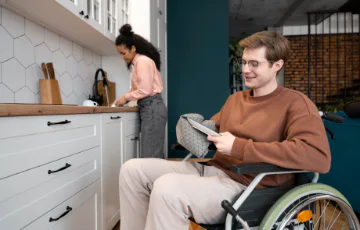Rise
What is Supported Independent Living?
Supported independent living, or “SIL”, is a type of paid personal support that is funded by the NDIS for eligible participants. It’s designed to help people with disabilities live with as much independence as possible and develop relevant skills. SIL covers a range of support services, including help with building routines, cooking, cleaning and developing social skills.
Who is SIL for?
SIL is for people who have higher support needs and require some level of 24/7 assistance at home. It’s designed for people with disabilities to live with other compatible NDIS participants or alone.
If a person with a disability lives with other people who are not NDIS participants, SIL may not be the most suitable support option. In this instance, individualised living options , which are NDIS supports designed to help participants live in a way that suits them, may be more appropriate.
There are also personal care supports , which provide assistance with everyday personal activities. These options may also be suitable for people who need help living alone, depending on their circumstances.
Funding Independent Living Support Services
To determine the level of funding a person is entitled to, the NDIS will refer to interviews with the participant and/or their family, guardian or carers, as well as any relevant medical or allied health reports or rosters of care. For people who have not previously been funded for SIL or who do not have adequate records describing their care needs, the NDIS may fund an assessment to gain a better understanding before moving forward.
Using this information, the NDIS will determine the right amount of support and, if relevant, how that support will be shared. They will also assess the intensity of the support needed and how the support requirements may change throughout the day.
Inclusions and exclusions
Inclusions
To be funded by the NDIS, the support must meet the funding criteria . As long as this is the case, SIL can include support for any of the following:
- Completing personal care tasks;
- Developing organisational, domestic and social skills;
- Implementing behaviour support plans;
- Providing supervision to promote safety and security;
- Assisting with medical appointments and administering medication; and
- Transportation to and from community access activities.
Exclusions
SIL does not cover the following:
- Everyday expenses that are not related to a person’s disability, such as the cost of food, rent or utilities;
- Supports that are not related to a person’s disability, such as holiday expenses or household budgeting; or
- Supports that are provided or funded by a service system outside of the NDIS, such as the health or justice system.
The Benefits of a Supported Independent Living Program
A SIL program provides personalised support that’s tailored to each person’s unique needs. These programs are flexible, meaning they can adapt to the participant's changing care needs over time. A SIL program can help improve participant quality of life by:
- Building independence
- Encouraging participation in social activities and community engagement
- Promoting safety and security
- Improving physical and mental health
SIL programs also serve as a crucial support mechanism for families, guardians and carers.
For broader help beyond SIL, explore all our NDIS and Disability Support services .
Rise and Supported Independent Living
At Rise, our expert team provides independent living support services and accommodation across the Perth metropolitan area.
Our goal is to empower the members of our Rise community to live life on their own terms, meet new people, learn new things and have fun.
If you have a question about supported independent living with Rise, get in contact with our friendly team today.
Contact us today.
We're here to support you.
8:00am - 4:00pm
across Perth










